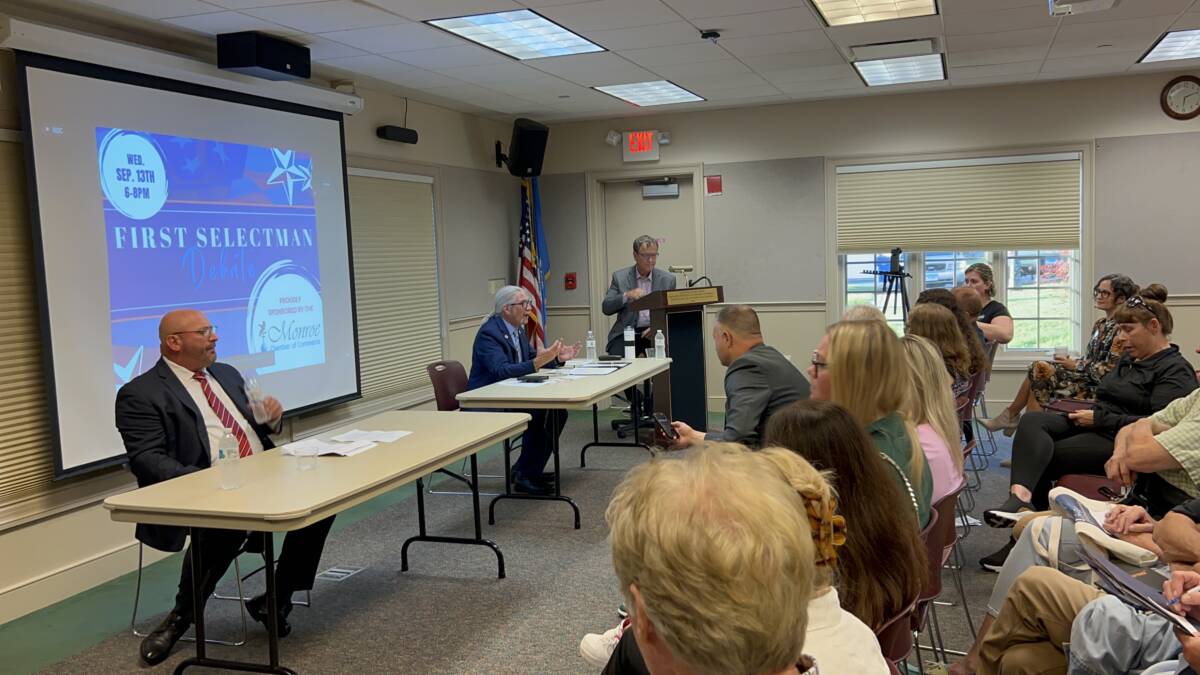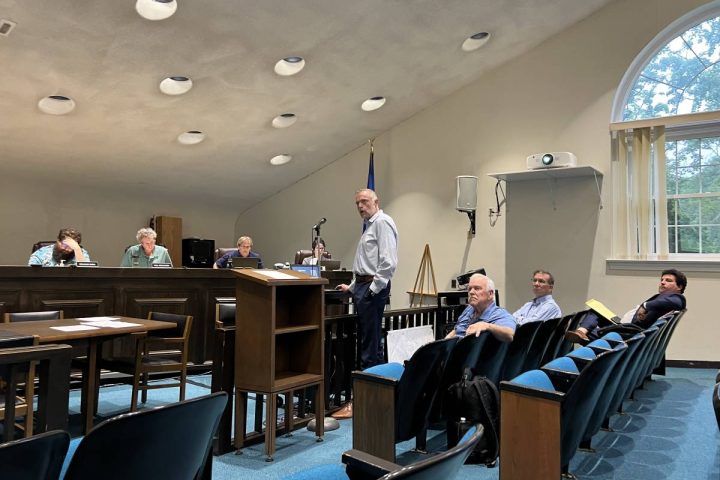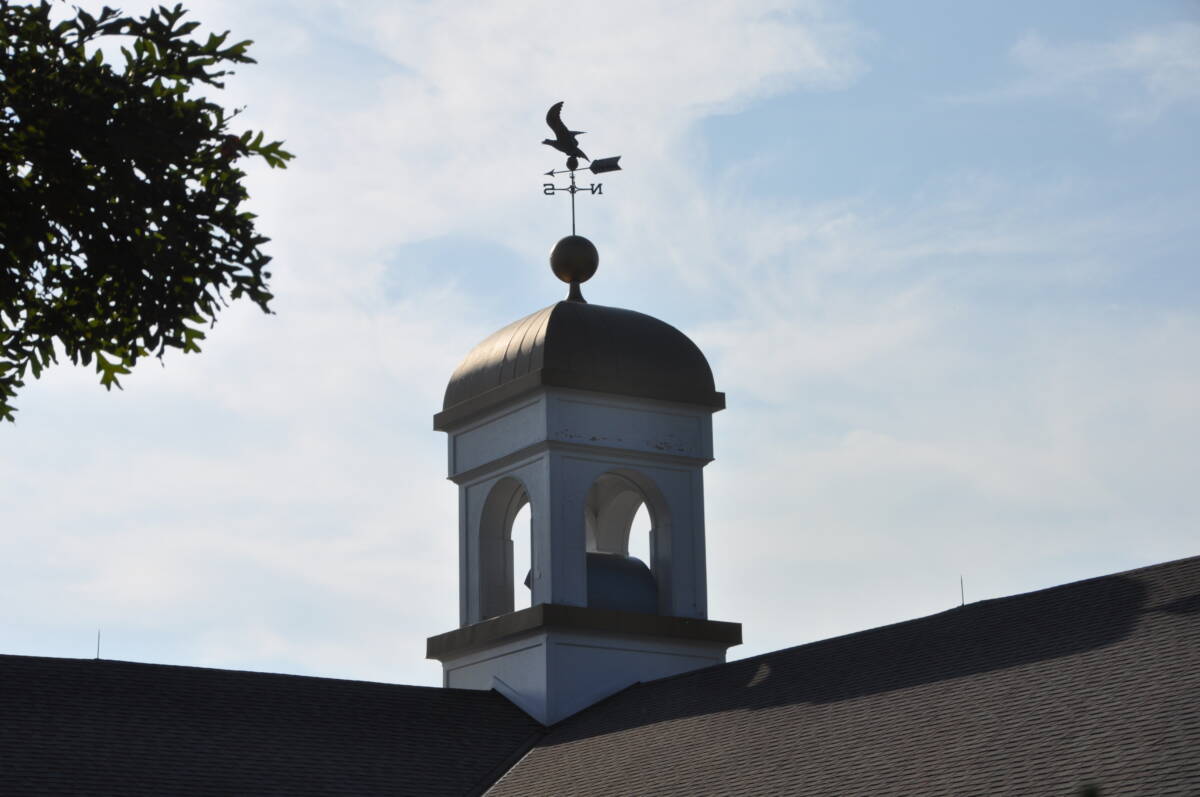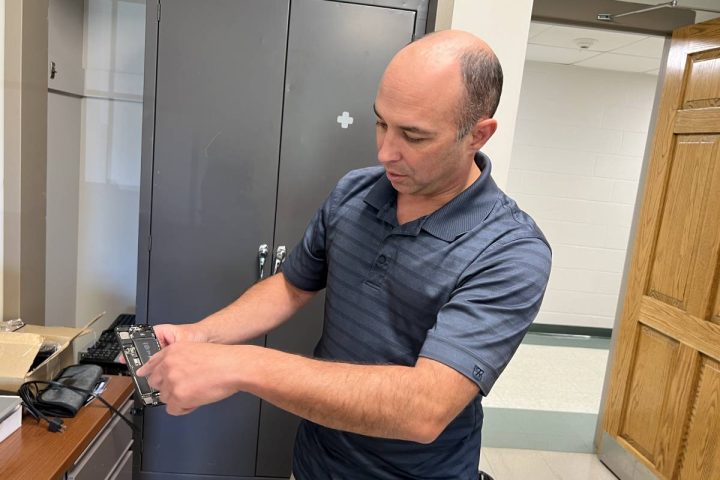MONROE, CT — Monroe’s two first selectman candidates have both been a commanding presence among supporters at their campaign fundraisers this summer, but Wednesday night’s debate at Edith Wheeler Memorial Library marked their first time facing pointed questions and rebuttals from an opponent in real time.
Jim Weinberg served as moderator in the debate between Town Councilman Terry Rooney, a Republican, and Board of Education member Jerry Stevens, a Democrat. It was held before a live audience of over 100 people and streamed on Zoom.
“I think being accountable in town is very important, obviously, and as the executive of the town, the first selectman, I think honesty is very important as well,” Rooney said in his closing statement. “We have heard all night that ‘I will cut, I will save, I will take your best interests to mind.’ But on Tuesday, January 18 of 2022, ladies and gentlemen, we saw a different story.”
Rooney went on to read Board of Education meeting minutes chronicling a motion to add $40,000 by Stevens, a motion to add $85,000 to the proposed budget seconded by Stevens, a motion to add $150,000 to the proposed budget voted for by Stevens. All voted down by the Republican majority.
“The increases that were voted on were in the area of $275,000,” Rooney said. “This is not an example of a human being that’s going to save you tax money.”
During the debate, one question dealt with diversity, asking the candidates how Monroe is doing and the role of government and schools.
Stevens talked about the 24,000 students he taught over the years as a teacher in the town’s school system and how their backgrounds didn’t matter.
“We’re Monroe strong,” he said. “As a town, promoting inclusion in the schools is crucial,” where all members feel they are learning in a safe environment.
Rooney agreed, saying he grew up in the city and worked on a diverse police force in Bridgeport, where race was never an issue. He also talked about the diversity of Monroe’s businesses, particularly Latin American restaurants.
“I have grown up in Monroe my whole life,” Stevens said. “I look at our inclusion. It’s ever changing. We grow with the times. Is my opponent willing to show up and raise the Pride Flag? Is he willing to accept everyone?”
“I have no rebuttal on that,” Rooney replied.
The following is a breakdown of issues covered in the debate followed by videos of both candidates’ opening and closing statements. During the debate, each candidate had three minutes to answer a question and a one minute rebuttal.
What are the primary challenges for the town that the next first selectman will face?
Stevens said the major issue he’s having is a lack of transparency and communication. “We need to communicate clearly,” he said, adding most people hear about things after they happen.
“What happened on Pepper Street is unacceptable,” he said of a road project plagued with delays. “We felt like we were in a vacuum. We didn’t know anything.”
As first selectman, Stevens said he wants to use the Reverse 911 to call residents with news other than emergencies with updates such as announcements of state championships won by Masuk sports teams.
Another challenge he mentioned is the Board of Education budget. “You have to be educated and informed,” Stevens said.
“The primary challenge for this town is always taxes,” Rooney said. “All of us are affected by inflation. It affects schools and services. The challenge isn’t for the first selectman to speak to the people. It’s taxes.”
Under Republican leadership, Rooney said the town’s six-year average tax increase has been below one percent per year. “One year we were a zero. We even had a deduction,” he said. “That has never been done before.”
As chairman of the EMS Building Committee, Rooney said he proved he is fiscally responsible. “It’s not just words, it’s actions,” he said.
In his rebuttal, Stevens noted the town has a $20 million reserve fund.
“Fiscally responsible? Yes. But you need a month-and-a-half. We are 23 percent over,” Stevens said. “Just think about the reserve. Think about what happens to your money.”
Rooney said the $20 million reserve fund is something he would consider looking at, but added the high reserve fund is important for unforeseen emergencies, such as the COVID-19 pandemic.
How has the town been doing with growth of business and industry without sewers?
“The lack of sewers keeps our town a town,” Rooney said. “Putting in larger things affects our rural character, but we’ve been able to see things we haven’t before. That’s a true testament to our leadership on planning and zoning.”
Rooney said he believes the town has done a good job at bringing in businesses and noted the only ways to raise revenue is to tax residents more or increase the commercial tax base.
“Our taxes are a pain point for all of us,” Stevens said. “I’m in favor of increasing the grand list.”
However, he said when there is a project for 190 residential units on Main Street, the town must strategically plan for it, while taking into account its affect on town services: police, fire and schools.
Stevens recalled how the developer for the 190 units told the Planning and Zoning Commission there would only be 17 students. “Nobody has a crystal ball, but …” he said, as many in the audience burst into laughter.
Stevens also said the town must streamline the permitting process by giving town land use staff the right tools to do the job.
He said it has been a long time since the town did a sewer facilities study. And when it comes to growing the grand list, he said the Economic Development Commission and land use must work as a group. “It’s not Jerry Stevens, it’s us working together,” he said.
“My opponent is obviously out of touch,” Rooney said. “We have a permitting process online. Our Planning and Zoning Commission is bipartisan. To say the commission hasn’t vetted every proposal is appalling to me. They’ve done an outstanding job of vetting applications.”
“Mr. Rooney, you can’t cancel me on this,” Stevens said.
Stevens said the town has a laser-fich program for permitting that no one else uses. “We haven’t given them the proper tools to do their job,” he said. “This isn’t about the Planning and Zoning Commission.”
How would you balance the needs and desires of the town with the ability to pay?
“The first selectman is responsible for keeping taxes as low as possible, while providing all the services the town needs,” Stevens said.
He said the town must do more to apply for grants, adding how he brought in over $100,000 worth of grants to his classroom as a teacher. He gave examples of millions of dollars worth of grants Monroe and other towns have gotten and said the town can apply for even more.
“We have to be innovative,” Stevens said. “Nothing works in a vacuum.”
Rooney agreed that taxes are of a great concern to many, but also said he spoke to seniors who cannot find affordable housing to stay in town. He said Monroe also needs more opportunities for young people to find affordable rents to live closer to their parents.
He said another interest among seniors is tax credits.
Stevens agreed that housing is an issue and said the town should collaborate with land owners and developers.
“The reality of the situation is yes, we don’t have a choice over what comes our way,” Rooney said. “We have to pick and choose what’s best for the town.”
Candidates were asked about the future of the Chalk Hill School building and delays with the Pepper Street project.
“Chalk Hill School is something that’s always on my mind,” Rooney said.
Because it is a school property, Rooney said there are only specific uses for it. He suggested a sports complex, with things like indoor soccer and lacrosse, that could bring in revenue.
Rooney said Pepper Street is a state project, which had delays from the COVID-19 pandemic.
He said he found an investor for Bart Center on Main Street, which is an “eyesore” and is now being renovated, as an example of what he can do to make things happen.
When the Board of Education turned Chalk Hill over to the town, Stevens said the estimated cost of rehabilitating it was $30 million and it would cost around $2 million to tear it down. He said Jockey Hollow Middle School uses Chalk Hill for some of its outdoor classes.
Stevens said there were offers for regional arts classes and for a regional education center over the years, adding one applicant proposed paying 75 percent to rehab the building with the town paying the remaining 25 percent, but the town declined.
On the Pepper Street project, Stevens said, “a state grant gives us the money and we’re supposed to do it. The buck stops here. We’re the stewards.”
“Pepper Street is almost done,” Rooney said. “The buck doesn’t stop for the town. It stops for everyone involved.”
Rooney said Stevens is “out of touch” on Chalk Hill, because the property cannot be used for anything unless it’s school related.
“A regional arts center is a school and I said ‘a regional education center,'” Stevens said.
The candidates were asked about volunteerism.
As chairman of the Monroe Republican Town Committee’s Vacancy Committee, Rooney said he appointed capable people to town boards and commissions. Rooney said the experience gave him insight into what all of the town boards and commissions do.
Stevens praised all of the town’s volunteers. He said he understands how boards and commissions are supposed to run independently, but added they should also work cohesively as a team.
“I’ve been part of the budget process, working to keep taxes low,” Stevens said. “The first selectman used to meet with all boards in one room to be collaborative. We can sit together and plan for Monroe. Why don’t we do that anymore?”
Rooney said the first selectman talks to the leaders of all of the town’s boards and commissions, adding that communication is integral to facilitating decisions.
Stevens said talking to the chair gives the first selectman one person’s opinion, when there are nine members on the school board.
How much should the town give to new businesses in tax breaks and for how long?
Stevens said he loves the concept because it grows the grand list, but asked, why not offer tax relief to existing businesses too?
Stevens suggested bringing in real estate brokers and seeing what other towns like Shelton and Oxford are doing. “Why do we always reinvent the wheel in Monroe?” he asked.
“We’re business-friendly and have helped businesses who asked,” Rooney said, mentioning Biomerics.
In response to Stevens asking why not do it for businesses that are already here, Rooney said the cost would be on the backs of residential taxpayers. “Wherever we give, the hole has to be filled in by someone else,” he said.
The candidates were asked who their favorite football team is and both said the Giants. The submitted question also asked how they will address accountability on town projects when vendors miss deadlines.
“I’m a hands on guy,” Rooney said. “I won’t sit in an office. I will do whatever it takes to get it done. I was trusted with the EMS building and worked with the committee to get it through.”
Stevens brought up the Pepper Street project again.
“I want to know why we didn’t pull the bond or at least threaten to on Pepper Street,” he said. “Why do we do a road, then tear it up for gas or water? I would never give my students power tools without a strategic plan. We’ve got to be proactive with this.”
“In regard to Pepper Street, I can tell you now that it is almost done,” Rooney said.
Rooney said pulling the bond was a consideration at one point.
“As first selectman, you have to rely on the advice of your attorneys when there can be legal action,” Rooney said. “My opponent’s right. That project was tough. But it’s almost done.”
Rooney said the project is in the past.
“Communication is the most important thing, that’s not just the third paragraph of a newsletter,” Stevens said of previous first selectman updates on the Pepper Street project. “I’m not threatening,” he added of pulling the bond. “I just want things to happen.”
Did the town do the right thing with remote learning during the COVID-19 pandemic?
“Yes,” Stevens said. “It may cost me the election, but I’m all about safety. A teacher had COVID four times. I can’t judge anything except the safety of that child.”
Stevens said school district leaders called in doctors and met with the health department over Zoom.
“I do,” Rooney said of whether he thought the town did the right thing. “That is the first time we, as a people, came across something like that. At the onset, we were all uncertain, so safety is paramount, so I agree with Zoom learning.”
“But when we found out who it affected, I think it lasted longer than it should have,” Rooney said. “Once we understood the virus and the age groups affected, we could have had kids go to school.”
Rooney said it is best for students when they are together. “I agree [on remote learning], but not on the length of time,” he said.
“I’m going with the experts here,” Stevens said. “Every time we took off the mask mandate, infections increased. I had to go by the advice of the doctors.”
Rooney said some Harvard-educated doctors were saying youths are resilient. “But we continued to separate them,” he said. “I agree we had to do what we had to do, but I’m going to double down that the town did it a little too long.”
Do you favor having a town dog park?
Rooney, who owns two dogs, said he favored having a dog park, adding the town has looked at open space properties.
“This is something overdue, not just the dog park, but the splash pad,” Stevens said of a feature in future plans for Wolfe Park.
Stevens also noted how there are plans to extend Rails to Trails on the Vitramon property. “I want a meeting where we show you the land and ask what you want,” he said of open space. “I’m all for a dog park, a bike path, a splash pad.”
“Anything that brings people together, I’m all for and I will work hard to make it happen if our residents want it,” Rooney said.
What will you do about blighted properties in town?
Stevens said there are residents who would say town action is “government overreach” telling people how to use their properties, and others will complain that a blighted property next door will hurt efforts to sell their house.
If there is a health and safety issue posed by a vacant building, Stevens said the town should get the legal process going to remove the hazards.
But he said there are also times when it is a Social Services issue, because the homeowner cannot afford to make repairs.
Rooney agreed that many are Social Services issues, with seniors living on fixed incomes not being able to clean up their properties. He expressed concern over starting a blight process and forcing seniors into a reverse mortgage. “I don’t want to put a senior out of their home,” he said.
Stevens said he has an 89-year-old mother and also does not want to force seniors out of their homes. He spoke of expanding Social Services and getting people on the ground to help. For instance, young people to mow lawns etc.
“I think we’re in alignment,” Rooney said. “This is a Social Services issue. It is a complicated issue.”
Would you favor freezing property taxes for all seniors?
Rooney said none of the seniors he spoke to asked for a tax freeze.
“Once you do that, a void would have to be filled,” he said. “It’s a very complicated issue. I don’t think that could happen. However, I do think there is more we can do.”
“I do agree with my opponent on this,” Stevens said.
Stevens said there are utility grants, heating grants and programs like Project Warmth seniors can apply for.
He said he would want to see how a freeze for all seniors would affect other things, such as town services, and wondered if that would make the town a less desirable place for seniors to live.
“I agree,” Rooney said. “I believe it’s an impossible feat.”
He said if the town increased the commercial tax base more, then it could consider something like that.
Stevens said there are “incredible services” and financial relief packages seniors could apply for, not that all would be approved for it. He said the town should get more information to seniors to help them.
One questioner said the town has a history of cutting services, then blaming the Board of Education budget.
Stevens said the town lost 23 employees over the last three years, making it more difficult to provide services in a timely manner.
“We need to get more in the budget process. As your first selectman, I will go to every Board of Education budget workshop,” Stevens said. “I will know the budget before it crosses my desk. My priority will be to offer the Blue Ribbon Schools we have now, while being fiscally responsible.”
He said the school board is doing a good job of finding cost savings.
“The Board of Education budget is very strong,” Rooney said. “But it’s important we talk about the first selectman’s job here.”
Rooney said the superintendent oversees the education side and the first selectman oversees the municipal side.
He said the town needs to provide children with a good education, but added the schools are well funded and town employees and police are underpaid.
“Yes, the first selectman does play a role in the Board of Education budget,” Stevens said in his rebuttal, noting how the first selectman can lower it, increase it or keep it the same during the process.
“When I think of the 20 percent that goes to the town, why haven’t we used that to increase services?” Stevens asked.
“It’s true the first selectman has a say in the Board of Education budget,” Rooney said.
On open positions at Town Hall, Rooney said the job market is different after COVID. “It is very difficult to find people to work with the specific skills for these jobs,” he said.
Rooney said if you hire the wrong person, it is harder to move on from them. “We have to find qualified people to fill these positions,” he said.
The candidates were asked their thoughts on signage along town roadways.
“I’m a major violator of this. My signs are everywhere,” Rooney joked. “I think a lot of signs we see are beneficial to the community. If it becomes a concern, as first selectman I would look into it.”
Rooney said signs for events like the Apple Festival and the Monroe Farmers’ Market can be informative, but conceded how some people can find too many signs to be an eyesore.
Stevens said a roofing business should be able to put its sign on the lawn of a house it’s working on, for example, but added that sometimes signs can cause a sight-line hazard.
“We have a sign ordinance,” he said.
Stevens agreed signs for town events are important, but added there are permits for commercial signs advertising things like a painting company. “If we do nothing, signs will be everywhere,” he said. “It’s an issue.”
Destination towns have things like breweries. What would you do as first selectman to make Monroe a destination town?
“I met with the EDC on this. I’m all for it,” Stevens said, suggesting Monroe start by helping its farms, citing successful places like Jones Family Farms in Shelton.
“When we lost Veracious, people cried,” he said. “Young people were mad when it left. I would love to have it back.”
Stevens suggested ideas like farms selling ice cream and soaps, and wine and antique trails. “Yes, I’m all for it. It brings in the tourism,” he said.
Rooney said he started Restaurant Week in Monroe years ago.
Because of Monroe’s history with the paranormal, Rooney said he’s thought of a haunted Halloween parade, as well as other events like a Santa Con with a trolley bringing people to bars and restaurants.
“We have a great lakefront, nine miles,” he said. “Why not pontoon boats?
“When I sat on EDC, a woman said she started Restaurant Week,” Stevens said. “I’m not going to argue the semantics of it.”
“You have to be innovative,” Rooney said. “It’s one thing to talk about it and another to do it. I have done it. I started Restaurant Week, advertising and promoting it with graphic design. I have proven I can take something from nothing and create it for the town.”
Opening statements:
Closing statements







I was concerned about a $5.00 charge at Wolfe park this past summer
Town stickers are supposed to make free into park
Taxes are high enough in Monroe to support no entrance fee